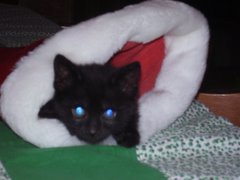It looks like Robert Byrd is heading down the same path:
Sen. Robert C. Byrd, one of President Bush's harshest critics, has become an unlikely ally on the Supreme Court nomination of Judge John G. Roberts Jr.Byrd has been a senator in WVA for a long time, and the electorate in West Virginia has become more conservative over the years. In 2004, the state's 5 electoral votes went to Bush by a 13 point margin. This may explain the sudden swerve to the right.
"I said to him, 'I am shouting your name from the steeple tops for reaching out, reaching across the aisle,'?" the West Virginia Democrat reported after taking a phone call from Mr. Bush to discuss a replacement for retiring Supreme Court Justice Sandra Day O'Connor.
After Mr. Bush nominated federal Judge Roberts this week, Mr. Byrd again issued a statement praising the president. "I thank President Bush for reaching out to senators on both sides of the aisle as he worked to select a nominee for the court," Mr. Byrd said. "I hope that this bipartisan cooperation will continue as the confirmation process begins."
The senator's praise of Mr. Bush is turnaround from a year ago when the West Virginian accused Mr. Bush of being a "green and arrogant president" who went to war before exhausting diplomacy...
Mr. Byrd embraced the same judicial philosophy as the president in his memoir, "Child of the Appalachian Coalfields," released earlier this summer. In the book, he repeatedly blamed "liberal judges" and "activist judges" for many of the nation's problems.
"One's life is probably in no greater danger in the jungles of deepest Africa than in the jungles of America's large cities," he writes. "In my judgment, much of the problem has been brought about by the mollycoddling of criminals by some of the liberal judges who have been placed on the nation's courts in recent years."
Mr. Byrd essentially endorsed Mr. Bush's primary stated strategy for picking Judge Roberts and other judicial nominees. "The high court's share of the responsibility for our increasing lawlessness lies in two areas -- its zeal for bringing about precipitous social change, and its overconcern for the rights of criminals and its underconcern for the rights and safety of society," he writes.
Interesting that though his memoir was released earlier this summer, the mainstream media had no mention of the senator's parallel statements with Bush on the judicial issue. Now with the appointment of Roberts, Kennedy and Schumer are out in front from the Democrats, and Byrd is nowhere to be seen.
I hope he follows Daschle right into retirement.
